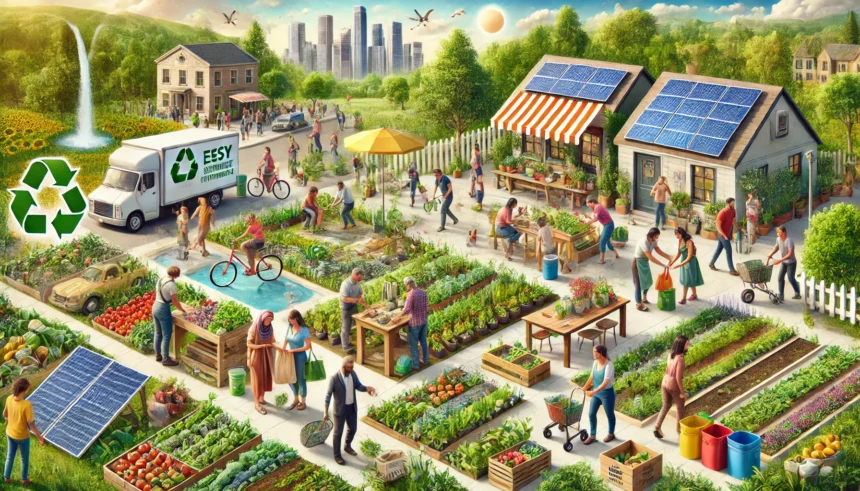Throughout my journey in environmental science, I’ve discovered many simple ways we can live more sustainably while saving money. With degrees and experience in this field, I’ve compiled a list of 32 practical tips to help us all contribute to a healthier planet.
The Power of Three: Reduce, Reuse, Recycle
- Reduce
- Reuse
- Recycle
This classic mantra is vital for sustainability. By reducing waste, reusing items, and recycling materials, we can significantly lessen our environmental impact. Small steps like these make a big difference.
Save Water and Energy
- Conserve Water
Assess your water usage and find ways to cut down. Simple actions like turning off the tap while brushing your teeth or taking shorter showers can lead to substantial water savings.
- Save Electricity
Using electricity efficiently not only lowers your bills but also reduces carbon emissions. Turn off lights when not in use, unplug electronics, and use natural lighting whenever possible.
- Use and Support Renewable Energy (If Possible)
While installing solar panels may be costly, supporting businesses that use renewable energy can make a difference. Explore solar power options or back companies that invest in renewables.
- Switch to LED Lights
LED lights use significantly less energy and last longer than traditional bulbs, making them a smart and sustainable choice.
- Choose Energy-Efficient Appliances
Look for appliances with the Energy Star label to save on electricity and gas. Examples include induction cooktops, convection ovens, and energy-efficient refrigerators.
Green Living Practices
- Plant Trees
Trees absorb carbon dioxide, provide oxygen, and help prevent water runoff. Planting trees or supporting reforestation efforts can make a significant environmental impact.
- Support Local Farmers
Buying locally grown food reduces transportation emissions and supports sustainable farming practices. Plus, local produce is often fresher and more nutritious.
- Eat Less Meat
Reducing meat consumption can significantly lower your carbon footprint. Try having a meatless day each week to help reduce greenhouse gas emissions from livestock farming.
- Choose Organic Food
Organic farming uses natural fertilizers and pest control methods, promoting healthier soil and reducing pollution. Look for the USDA Organic seal when shopping.
- Compost Food Scraps
Composting diverts organic waste from landfills and creates nutrient-rich soil. Start a compost bin for your kitchen scraps like fruit peels and coffee grounds.
- Reduce Food Waste
Plan meals and shop wisely to avoid buying too much food. Meal prepping and using leftovers creatively can save money and reduce waste.
- Shop Second-hand
Buying second-hand items reduces demand for new products and decreases waste. Explore thrift shops and online marketplaces for great deals.
- Mend and Repair Items
Fixing broken items instead of replacing them extends their life and reduces waste. Whether it’s sewing a tear or repairing furniture, mending saves money and resources.
Sustainable Choices in Daily Life
- Avoid Single-use Plastics
Use reusable alternatives like water bottles, shopping bags, and food containers to cut down on single-use plastics. This helps reduce plastic pollution in our oceans and landfills.
- Use Eco-friendly Cleaning Products
Switch to natural cleaning products to reduce exposure to harmful chemicals and lessen environmental pollution. You can even make your own cleaners using ingredients like vinegar and baking soda.
- Volunteer for Environmental Causes
Join local clean-up events or tree-planting initiatives to contribute to a healthier environment. Volunteering connects you with like-minded individuals and makes a tangible impact.
- Support Sustainable Brands
Purchase from companies that prioritize sustainability. B Corporations, for example, meet high standards for social and environmental performance.
Efficient Resource Use
- Reduce Paper Usage
Opt for electronic bills and statements, use recycled paper, and print double-sided. Small changes can save trees and reduce pollution.
- Use Public Transportation
Taking the bus, train, or subway reduces your carbon footprint and saves money on car expenses. It’s an efficient and eco-friendly way to get around.
- Bike or Walk Instead of Driving
For short trips, biking or walking is a great alternative to driving. It’s healthier for you and better for the environment.
- Embrace Minimalism
Focus on quality over quantity. Buying fewer, higher-quality items reduces waste and encourages mindful consumption.
- Reduce Your Carbon Footprint
Use energy-efficient appliances, reduce car travel, and recycle. These actions help lower greenhouse gas emissions and combat climate change.
Conscious Consumerism
- Avoid Fast Fashion and Promote Slow Fashion
Choose durable, timeless clothing over trendy, disposable fashion. Donate or recycle old clothes to reduce textile waste.
- Practice Eco-friendly Gardening
Use natural fertilizers and plant native species to create a sustainable garden. This supports local wildlife and reduces chemical use.
- Support Local and Sustainable Fishing Practices
Choose seafood with eco-certifications to ensure it’s sourced sustainably. This helps preserve marine ecosystems and fish populations.
- Participate in Recycling Programs
Sort and recycle materials like paper, plastics, and electronics. Recycling conserves resources and reduces waste in landfills.
- Encourage Local Government to Implement Green Initiatives
Advocate for policies that support sustainability. Your voice can help bring about important changes in your community.
- Be an Advocate for Sustainable Living
Lead by example and inspire others to adopt eco-friendly practices. Share your knowledge and passion for sustainability.
- Educate Yourself
Continuously learn about sustainability to make informed decisions. Staying educated helps you understand the impact of your choices and find new ways to live sustainably.
By incorporating these tips into our daily lives, we can all contribute to a more sustainable future. Every small action adds up to make a big difference. Let’s work together to protect our planet for future generations.
















